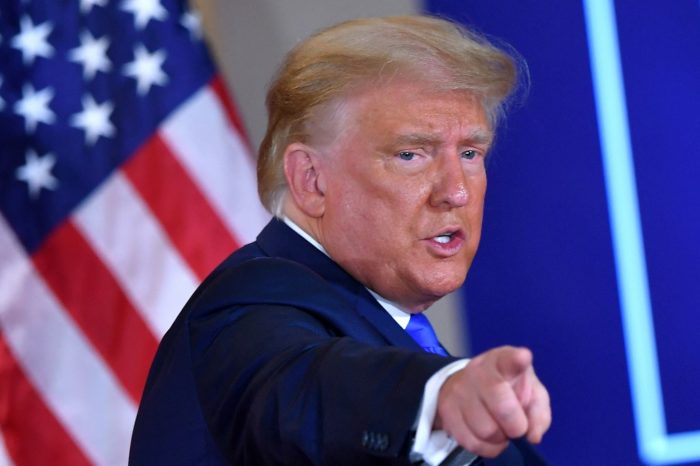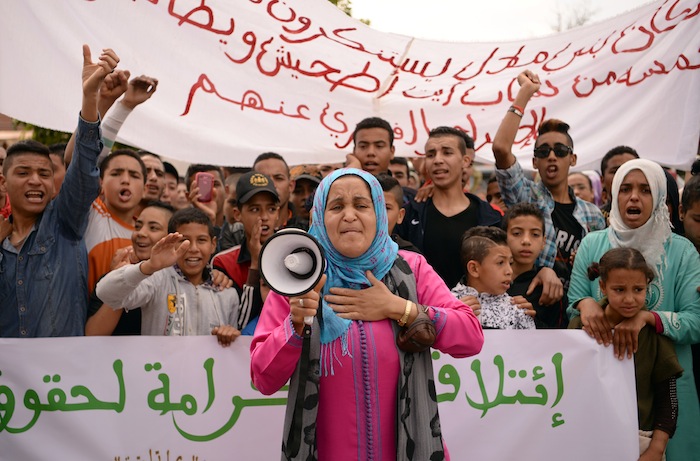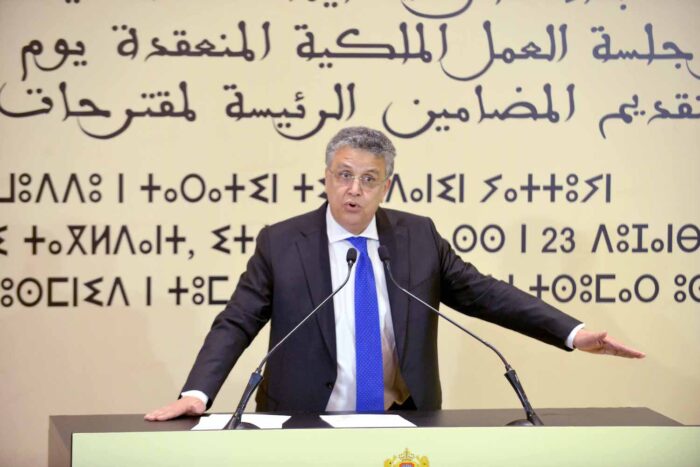“Our country will no longer be a woke nation.” In his policy address delivered to Congress on Tuesday, March 4, Donald Trump reiterated his intent to advance his “common sense revolution” to “end the tyranny of so-called diversity, equity, and inclusion policies.”
Academia is among the first to suffer the consequences: halted international collaborations, mass layoffs, drastic budget cuts to research projects, censorship of words or topics like diversity, climate, and inclusion… The scientific community is mobilizing, notably through the creation of the “Stand Up For Science” movement, which condemns “an obscurantist offensive.” But will this resistance prevent the American president from winning this cultural battle?
“Trump isn’t part of the PR game,” asserts political analyst Mustapha Sehimi in an interview with TelQuel. “Hollywood has quieted down, and many stars now own their Trumpism, the media courts him, the silent majority wears the red Maga (Make America Great Again) hat—it’s trendy…,” he adds. The analyst argues that “cultural wokeness, thriving on American campuses or in the arts, has disconnected from a real, popular, and right-leaning America.”
The idea that wokeness is an ideology adopted by urban and intellectual elites who champion inclusivity and egalitarianism in their rhetoric, while remaining oblivious to the growing divide separating them from the rest of the population, is precisely the theory developed by one of the rising figures in the American intellectual scene: sociologist Musa El-Gharbi.
His essay We Have Never Been Woke, published last year by Princeton University Press, has been praised by The New Yorker and The Washington Post, among others.

For Jamal Ouazzani, activist and host of the intersectional podcast JINS, it is the opposite dynamic at play: “Crying ‘wokeness’ is a way for the elite to preserve their social position. They attempt to safeguard privileges gained through force, coercion, and injustice—a mechanism that unfolds in rhetoric like the great replacement, the ideology of inserting dangerous discourses, lobbies, and anarchic radicalism, when it is precisely this elite that colonized, spread false truths, fueled million-dollar lobbies, and incited upheavals like the January 6, 2021 Capitol attack.”
“The real danger is not wokeness,” adds our interviewee, “but the authoritarian project hidden behind this rhetoric: an ultraconservative steamroller aimed at crushing all social progress in the name of a reactionary fantasy of ‘restored greatness’.”
“To claim that Trump’s victory would be a defeat for wokeness is already falling into the rhetorical trap set by the far right,” laments Jamal Ouazzani, who warns of a semantic shift serving conservatives: “The word ‘woke,’ which originally signified vigilance against injustice, has been twisted into a grotesque caricature by those who refuse to let power dynamics be challenged…”
Wokeness and Islamism: a paradoxical alliance?
“Why doesn’t wokeness thrive in ‘Arab’ lands?” The question is posed by Franco-Algerian writer Kamel Daoud in one of his op-eds published in the French weekly Le Point on March 11, 2023. The controversial intellectual, winner of the 2025 Goncourt Prize for his novel Houris, leans into ambiguity: while he argues that the so-called “Arab” world is “in denial” about racism, homophobia, and sexism—deeply present in its societies—developing this thesis doesn’t stop him from participating in conferences organized by the Laboratoire de la République (a Paris-based think tank examining, among other things, the potential dangers of importing the phenomenon), where Daoud claims wokeness is “not only dangerous but also boring.”
So, is the Arab world woke or antiwoke? Few intellectuals tackle the subject. Online, however, it fuels tensions, and many critics of wokeness openly admire the “common sense revolution” championed by the American president and his ally Elon Musk. “What is labeled ‘wokeness’ in the West is merely a distorted version of the anti-colonial, feminist, and social struggles that have existed for decades in the Arab and Muslim world,” asserts Jamal Ouazzani.

Wokeness, the banner of minorities victimized by discrimination: racism, homophobia, sexism… and Islamophobia? Some far-right Western intellectuals dare to conflate wokeness and Islamism as equivalents. Controversial pundit Céline Pina argues that “though fundamentally opposed, Islamism and wokeness converge in their opposition to Western society.” For the French essayist, “this paradoxical alliance relies on identifying a common enemy, facilitating the infiltration of Islamism into woke struggles.”
The same tune comes from Lorenzo Vidino, director of the extremism program at George Washington University (United States). Author of a study for Fondapol titled The Rise of Woke Islamism in the Western World, the researcher claims that “many woke issues align with the Islamist agenda.”
Echoing this, Mustapha Sehimi draws parallels with the work of certain American postcolonial sociologists who highlight two camps, even two societies: on one side, whites and their privileges; on the other, minorities, victims, the “racialized.”
“Along these lines, European Muslims are part of the ‘racialized,’” explains the political analyst. “They are victims of a ‘systemic racism’ redefined along dual ethnic and religious lines. It has a name: systematic, institutional, or state-driven Islamophobia. These notions have been well understood by Islamists and integrated into their rhetoric.” Islamists who, according to him, “have worked to ground their political demands in decolonial and postcolonial theories, as well as intersectionality.”
For Jamal Ouazzani, rhetoric equating wokeness and Islamism is “a political weapon,” a discourse meant to “delegitimize struggles, sow confusion, and prevent any challenge to patriarchal power.”
The Moudawana, target of the anti-woke?
But what about Islamist movements within Arab countries themselves? Do they also borrow the codes of wokeness to denounce the establishment created by elites they deem « too Westernized »?
In Morocco, the equation is not simple, and the posture of the Minister of Justice illustrates this complexity: in his speech on March 13, 2023, in Lisbon during a European conference (a meeting dedicated to launching the 5th phase of the joint program between the European Union and the Council of Europe titled Protecting Human Rights, the Rule of Law, and Democracy Through Shared Standards in the Southern Mediterranean), Abdellatif Ouahbi emphasized the importance of Muslim values in preserving the family nucleus: « The West’s attempts to impose human rights culture on the South according to Western conceptions provoke sensitivities and absolute rejection of these rights’ culture within our societies. »
While the word wokeness is not uttered, the allusion is barely veiled. Yet this same minister is portrayed as one of the most progressive figures on the consultative commission tasked with reforming the Moudawana.

“This stance by the Minister of Justice reiterates Morocco’s commitment to preserving Islamic and family values,” political analyst Mustapha Sehimi explained to TelQuel. “This framework is regarded as a normative sanctuary with a religious foundation, but also a societal and cultural one.”
The academic and legal expert notes that the 2011 Constitution includes around twenty articles (19 to 39) recognizing freedoms and fundamental rights, “a major advance aligning with Western democratic standards,” but, at the same time, citizenship status derives from an organic community—the Ummah established by Islam, the state religion (Article 3 of the Constitution). In other words, religion remains the supreme norm into which democracy is inclusively integrated. How to manage this mix? “That is the entire challenge of reforming the Moudawana,” acknowledges Mustapha Sehimi.
The scholar emphasizes that Morocco is distinguished by a “religious matrix rooted in an anthropological security encompassing all aspects of individual and social life.” This is why, he argues, it is difficult within Moroccan legislation to consider advancements on issues such as medically assisted procreation, recognition of same-sex marriage, or euthanasia.
“From this perspective, wokeness faces limits in its dissemination within the politico-religious concepts of today’s Morocco… and tomorrow’s,” he states. For the political analyst, while “Morocco is actively adapting to the values of modernity and democracy,” it must confront wokeness—a Western vector, even a “war machine”—aimed at the “fragmentation of society.”
“It is not wokeness that threatens the Moroccan family, but the legal inequalities that trap women in positions of subordination”
Abdellatif Ouahbi’s speech at the 2023 Lisbon conference is, according to Jamal Ouazzani, “the perfect example of how wokeness is used to justify political stagnation.” “By claiming to defend ‘Muslim values,’ he seeks to freeze Morocco in an idealized past where the family would be a stable and sacred entity. But this vision ignores contemporary realities: Moroccan women work, divorce, raise children alone, and demand their rights,” notes the activist, who has just published Amour — Révolutionner l’amour grâce à la sagesse arabe et/ou musulmane [Love — Revolutionizing Love Through Arab and/or Muslim Wisdom], his first essay, published by éditions Leduc Société and prefaced by Franco-Moroccan novelist Leila Slimani.
“It is not wokeness that threatens the Moroccan family, but the legal inequalities that trap women in positions of subordination,” insists our interviewee, who stresses that reforming the Moudawana is “an urgent necessity to ensure justice and equality, not a Western-imported whim.”
In any case, in Morocco, wokeness has not (yet) infiltrated political discourse, at least not in this terminology. However, its extrapolations, themes, and excesses—imagined or real—are widely co-opted, even instrumentalized, by both progressives and conservatives, on the now-favorite playground of free speech advocates: internet.
Written in French by Bouchra El Azhari, edited in English by Eric Nielson




